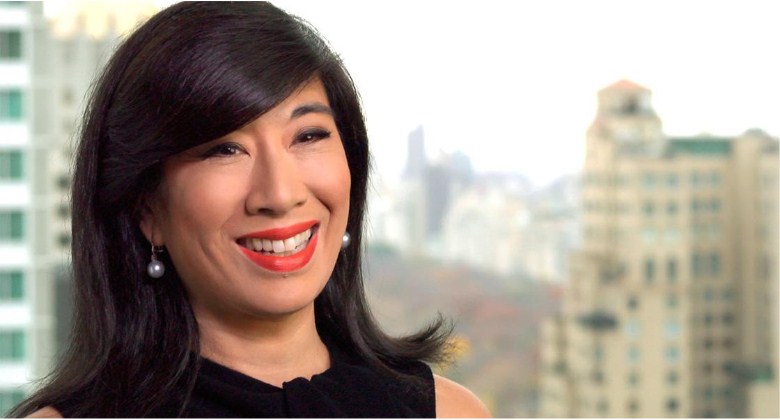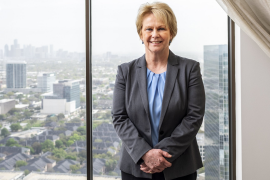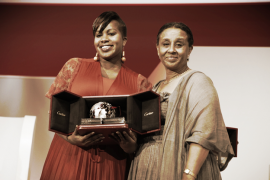Born in Toronto, Jung was born in 1959 in Toronto, Ontario, Canada. Her family moved to Wellesley, Massachusetts, when she was only two years old. Jung’s mother was born in Shanghai and was a chemical engineer; her father was born in Hong Kong and was an architect. Jung has one younger brother, Mark. When she was young, Jung studied not only the regular subjects offered at a Massachusetts school, but studied the Mandarin language as well.
She also began piano lessons, taught by her mother, when she was only five years old. Jung has admitted to being a lacklustre student. The only reason she got good grades at first was that her parents would offer her something she wanted in return for earning A’s. When she was in fourth grade, for instance, she desperately wanted a set of coloured pencils. Her parents told her that if at the end of the grade marking period she earned all A’s, they would get it for her. She hunkered down to work, and by the end of the grading period, those pencils were hers. It was something she never forgot. She has credited her parents and instances like this one with furthering her resolve and ambition.
In high school, Jung used her determination to get involved in extracurricular activities, especially the student government. She started out as a class secretary before becoming president of the student body and went on from high school to attend the elite Princeton University. She earned a bachelor of arts degree in English literature in 1979, graduating magna cum laude from Princeton. She intended to continue her studies by going to law school after a short break but decided on a detour. She had gotten a job at Bloomingdale’s as a manager in training, and she saw the position as giving her the edge she would need to make it in the field of law.
She did so well at Bloomingdale’s that she moved to a job at the I. Magnin stores. From there she became the executive vice president in charge of merchandising for women’s apparel, cosmetics, and accessories at Neiman Marcus. And with her change of companies came a change of careers. Law vanished into the background as Jung found herself in the midst of the world she liked. She wanted a new challenge, however, and found one when she started working for Avon Products, Inc., as a consultant in 1993. The company that had been around for over a hundred years was ailing and needed a fresh burst of energy and life to keep it going. The higher-ups at Avon liked what Jung had to bring to the company as a consultant, and they hired her as president of the product marketing group for U.S. operations in 1994. In that position, she worked on continuing the company’s traditional branding efforts while trying to introduce more modern lines to the mix. She introduced the Avon Apparel line, which proved to be very successful. She also suggested getting rid of a large number of Avon’s old fragrances and introducing new ones. She was behind the introduction of such new favourites as Far Away, Millennia, and Natori.
She also worked on coming up with a better marketing pitch for the company. She came up with the slogan “Just Another Avon Lady,” which was launched in 1995. With her new slogan, Jung was trying to re-brand the company as younger and hipper, but also as being more sophisticated and quality-filled. This was helped by-products such as Anew, which was the first skin cream with alpha hydroxy, made to help hide wrinkles. She also got Olympic athletes Jackie Joyner-Kersee and Becky Dyroen-Lancer to help with the campaign, and Avon became the official fragrance and cosmetics sponsor of the 1996 Olympic Games, held in Atlanta, Georgia. The company put together The Olympic Women exhibition, focusing on women athletes at the games, something that not only promoted female athleticism but also helped put Avon into the spotlight. Because of all the things Jung set up in 1996 she was named “Marketer of the Year” for 1996 by Brandweek.
Always looking for bigger and better ways to promote Avon, in 1997 Jung came up with the “Dare to Change Your Mind about Avon” ad campaign, something that showed the company knew about its outdated image and was about to change it. Also in 1997, the CEO of Avon stepped down. It was thought that Jung might be considered for the job, but instead of promoting someone from inside the company, Avon hired from outside, choosing instead the CEO of Duracell, Charles Perrin. Someone must have felt that Jung was soon to step into power, however, because in 1997 she was named one of the top “25 Women to Watch” by Advertising Age. She was also given the National Outstanding Mother Award and the American Advertising Federation’s Advertising Hall of Achievement award that year. Perrin, on the other hand, met with problems at the company, and a mere two years later Jung was made the CEO of Avon. She was the first female CEO in Avon’s history, and that was quite a long history, as the company was 116 years old at that time. She became chairwoman of Avon in 2001. Prior to that, Jung had been listed at number eight in “Corporate America’s 50 Most Powerful Women” in 1998.
Since becoming CEO of Avon, Jung has become known for her professional, businesslike demeanour and for her innovative ideas.
Two years after taking over the CEO position at Avon, Jung talked to Harper’s Bazaar about her job. “My job has its pros and its cons. There’s the opportunity to be a role model, and then there’s a lot of heavy responsibility that can be very difficult…. But I’m more comfortable now with my public role as it relates to my personal life than I was two years ago. Statistics show that it’s still a story when women reach the very top of the ladder, and we have a responsibility to create paths for women to succeed.”
Since her rise to CEO, Jung has taken Avon international. It started out as an American company and is still run in a purely American way, with Avon “ladies” selling directly to buyers, but Jung has begun to expand the concept worldwide. By the early twenty-first century, Avon was sold in over 143 countries. In 2001 nearly 40 percent of Avon’s total profits came from South and Central American alone. In 2003 Jung pushed Avon to start a line of makeup called “Mark,” aimed towards teenagers and college-age women. According to Crains New York Business, Jung said about the changes: “I want to keep it hip. We have to be able to change in a snap, to have an edge.” She also has helped raise money for breast cancer, the disease that took her grandmother’s life.
Since her acquisition of the CEO position, Jung has learned about personal compromise. She has also made an environment at Avon where parents can take time off to attend their children’s functions and take care of their family, as long as their work does not suffer for it. She is on the board of General Electric and was nominated to be on the board of the New York Stock Exchange. She is on the boards of such non-profit organizations like the New York-Presbyterian Hospital and Catalyst, a company focused on women in business. Jung is one of only two female Fortune 500 CEOs. She has been named one of the 50 Most Powerful Women in U.S. Business by Fortune magazine.
As for Avon, the company did a turnaround after Jung took over. According to Fortune magazine, “In her first five years as CEO, Andrea Jung gave Avon a badly needed facelift. From 2000 through 2004, revenues rose from $5.3 billion to $7.7 billion, and profits nearly tripled.” Jung was able to find popular and strong women to advertise the company on television, among them tennis players Venus and Serena Williams. Jung told Harper’s Bazaar, “Venus and Serena’s story was such a natural fit for us. They have proven to a global audience that women can do anything.” With so much success, Jung’s reign as CEO of Avon was one to continue to watch.
Currently, Andrea Jung is the President and CEO of Grameen America. Ms Jung joined Grameen America with the goal of scaling the organization to solve economic issues for women and their families across the country.




